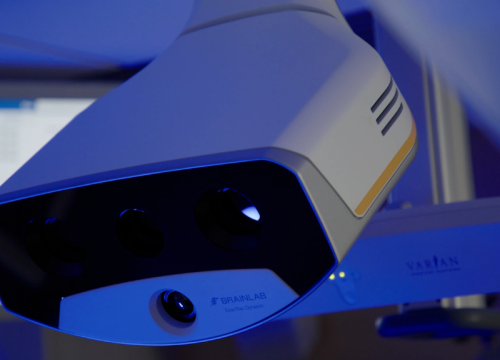Surgical oncology is the surgical treatment and management of patients with cancer. The goal of cancer surgery typically is to remove as much of the cancer as possible, while maintaining a good quality of life for the patient.
Surgical oncologists at Valley use different surgical techniques to treat cancer, including:
- Open surgery, involves making an incision to reach the cancer
- Minimally invasive surgery, involves smaller incisions than open surgery
- Robotic surgery, involves smaller incisions and greater precision through a robotic surgery system used by surgeons
- Palliative treatments, often performed to improve quality of life (e.g., to address symptoms) rather than to cure the cancer
- Radiofrequency ablation, uses heat by radio waves to destroy cancer cells
The Valley Approach to Surgical Oncology
The surgical oncology team at Valley provides advanced surgical treatment for a range of cancers. Our fellowship-trained experts use the latest surgical techniques to remove and treat cancer, including minimally invasive surgery and robotic surgery. They work with each patient to achieve the best possible outcome that addresses that patient’s needs.
Our surgical oncologists work closely with gynecologic oncologists, thoracic surgeons, urologic oncologists and other cancer specialists at the Valley-Mount Sinai Comprehensive Cancer Center.
Why Choose Valley for Surgical Oncology?
- More experience, better outcomes: For certain surgical procedures, such as the Whipple procedure for pancreatic cancer, research has shown that the more surgeries a hospital performs, the better the outcomes. Valley’s gastrointestinal cancer program is considered a “high volume” program with superior outcomes.
- Commission on Cancer accreditation: Valley-Mount Sinai Comprehensive Cancer Center is accredited by the American College of Surgeon’s Commission on Cancer and has received its Outstanding Achievement Award. This designation means that Valley adheres to the highest standards for cancer surgery and treatment.
- Minimally invasive surgery options: Cancer surgery options at Valley include minimally invasive options such as VATS and da Vinci® Surgery. Minimally invasive and robotic surgeries typically result in less pain and a faster recovery, which allows patients to start their next phase of cancer treatment sooner.
- Cytoreductive surgery with HIPEC: Our surgical oncologists offer cytoreductive surgery with HIPEC (hyperthermic intraperitoneal chemotherapy) for some advanced cancers that have spread to the lining of the abdominal cavity, also referred to as peritoneal surface malignancies. These include mesothelioma, metastatic colon cancer and ovarian cancer. Cytoreductive (debulking) surgery removes as much of the cancer as possible. Heated chemotherapy (HIPEC) is then given directly to the affected area to kill any remaining cancer cells.
Related Treatments
The following is a partial list of surgical procedures performed by surgical oncologists at Valley:
- Bile duct resections and reconstruction
- Colorectal surgery
- Cytoreductive surgery and HIPEC for peritoneal surface malignancies
- Gallbladder surgery
- Gastric resection
- Liver resection
- Pancreatic resection, such as the Whipple procedure
- Radiofrequency ablation of liver tumors
- Robotic surgery
- Sarcoma resection
- Sentinel lymph node biopsy and lymph node dissection
- Splenectomy
- Vascularized lymph node transplant for lymphedema
- Wide local excision of skin cancers such as melanoma, basal cell carcinoma and squamous cell carcinoma


















